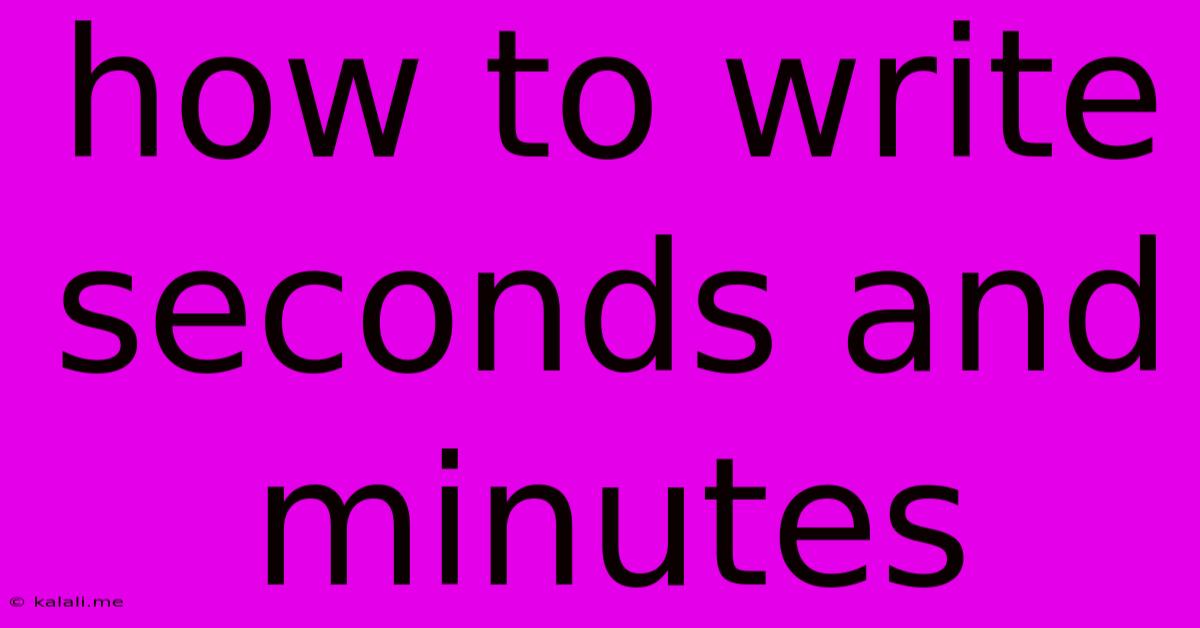How To Write Seconds And Minutes
Kalali
Jun 02, 2025 · 3 min read

Table of Contents
Mastering the Art of Writing Seconds and Minutes: A Comprehensive Guide
This guide will equip you with the knowledge and skills to accurately and effectively write seconds and minutes in various contexts, from casual conversation to formal scientific reports. We’ll cover different styles, common errors to avoid, and best practices for clarity and precision. This comprehensive guide ensures your writing is not only grammatically correct but also easily understood by your audience.
Understanding the Basics: Seconds vs. Minutes
Before diving into the nuances of writing seconds and minutes, let's establish a clear understanding of the basic units of time. A minute consists of 60 seconds. While seemingly simple, the way you represent these units in writing can significantly impact readability and accuracy.
Writing Seconds and Minutes in Different Contexts
The method of writing seconds and minutes depends heavily on the context. Here's a breakdown of common scenarios:
1. Timekeeping (Clocks and Timers):
- Standard Format (hh:mm:ss): This is the most prevalent method for displaying time, particularly in digital clocks and timers. For example, 02:15:30 represents 2 hours, 15 minutes, and 30 seconds. Leading zeros are typically used for hours and minutes under 10.
- Spoken Format: When speaking, you would say "two hours, fifteen minutes, and thirty seconds."
2. Duration and Elapsed Time:
- Short Durations: For short durations, you can use words: "The race took 2 minutes and 10 seconds."
- Longer Durations: For longer durations, using hours, minutes, and seconds together is recommended, for instance: "The flight lasted 5 hours, 35 minutes, and 45 seconds."
3. Scientific and Technical Writing:
- Decimal Notation: In scientific contexts, it's often preferable to use decimal notation to represent seconds and minutes. For instance, 2.15 minutes is equivalent to 2 minutes and 9 seconds (0.15 minutes x 60 seconds/minute = 9 seconds). This approach increases precision and simplifies calculations.
- Unit Symbols: Include the appropriate unit symbols (s for seconds, min for minutes) to enhance clarity and adhere to scientific writing conventions.
Common Mistakes to Avoid
- Inconsistent Formatting: Maintain consistency in your style throughout your text. Avoid switching between different formats (e.g., using both "2 mins" and "2 minutes").
- Ambiguity: Ensure there’s no room for misinterpretation. Be precise in your phrasing to avoid confusion.
- Incorrect Unit Conversion: Double-check your conversions between minutes and seconds to maintain accuracy.
Best Practices for Clarity and Precision
- Context is Key: Always consider your audience and the context of your writing when choosing a format.
- Use Appropriate Units: Select the units (seconds, minutes, hours) that best represent the duration.
- Proofread Carefully: Review your work for consistency and accuracy before publishing or submitting it.
Conclusion
Writing seconds and minutes correctly involves more than just placing numbers together. By understanding the different contexts and best practices outlined in this guide, you can ensure your writing is accurate, clear, and professional, whether you're documenting elapsed time, recording scientific data, or simply telling someone how long something took. Remember to prioritize clarity and consistency to avoid any ambiguity. Mastering these principles will significantly improve the overall quality and impact of your written work.
Latest Posts
Latest Posts
-
Read The World God Only Knows Manga
Jun 04, 2025
-
14 Year Old Has No Interest
Jun 04, 2025
-
All Liars Shall Go To Hell
Jun 04, 2025
-
Convert Switched Outlet To Ceiling Light
Jun 04, 2025
-
Can A Gas Dryer Be Converted To Electric
Jun 04, 2025
Related Post
Thank you for visiting our website which covers about How To Write Seconds And Minutes . We hope the information provided has been useful to you. Feel free to contact us if you have any questions or need further assistance. See you next time and don't miss to bookmark.